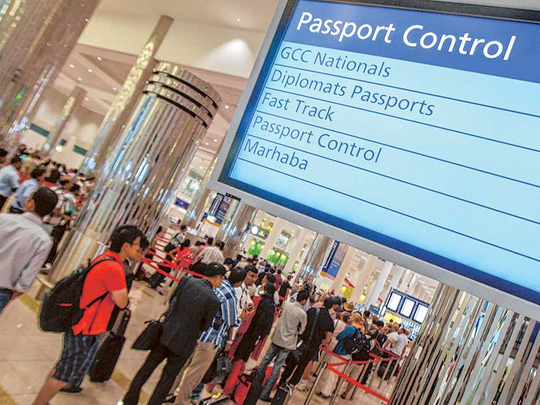
Dubai: Running from unpaid debt in the UAE, even as far back as 10 years ago — whether intentional or not — can come back to haunt residents.
Philippine Consul-General Paul Raymund Cortes gave this warning to his compatriots after finding out that as many as 20 Filipinos had been detained due to unpaid debt in the first five months of the year. The Filipinos were former UAE residents who were travelling to and from Europe and other Gulf countries and were arrested while transiting through Dubai.
“The moment you fly via any airline that transits in the UAE or GCC country, you can get flagged by the Immigration. Your name is already in the system,” Cortes said.
“Just because you have a new passport does not mean your name is no longer in the system. Remember your details are still the same, your name, place and date of birth, face, [fingerprints], all of that are still the same.”
An Assistance-To-Nationals (ATN) officer handling the cases explained that those detained had unpaid debts, both loans and credit card, going as far back as 10 years ago. “All of them had previous employment in the UAE and transferred elsewhere. Many of them thought they did not have any pending cases,” the ATN officer said.
“Most of the outstanding debts were small amounts like Dh10,000. But there were two [Filipinos] who had loans of between Dh100,000 and Dh150,000,” he added.
Debt is one of the top five issues affecting Filipinos in the UAE, according to officials. The Department of Foreign Affairs in Manila has twice issued an advisory warning Filipinos against applying for loans and using credit cards that they cannot pay. The advisories were issued in view of the “alarming increase in the number of Filipinos detained due to unpaid loans”.
The Foreign Affairs Department clarified that the Philippine government cannot help Filipinos with debt cases as these are considered a private matter between the lender and the borrower. The government cannot intervene using taxpayer’s money.
Attorney Barney Almazar, a licensed UAE legal consultant and partner at Gulf Law who helps Filipinos with debt cases, said his office handled around 60 cases of Filipinos detained for unpaid debt in 2015, but it is unclear how many were apprehended while in transit.
“Most of them had this misconception that since they did not issue any personal cheques, the bank wouldn’t have any means to file a bounced cheque case against them. In many of these instances, the banks used bank-issued cheques that applicants had signed during the application of their loans or credit cards,” Almazar said.
Almazar also said many of the detained believe that since they did not receive any court summons, they do not have any cases. They often just come to know that they have cases when they pass through immigration since police and immigration systems are linked.
“If you have a loan, it is morally right that you pay it. Others who, by some tough luck, lost their source of income, chose to leave the country before a case was filed against them. But they can still pay their debt even from abroad to avoid getting into trouble,” Almazar said.
Cortes reminded his compatriots to follow the laws of the host country to the last letter.
“Please spend within your means. This is not our country, so please respect and follow their laws,” Cortes said.
HOW TO PAY YOUR DEBT AND CLEAR YOUR NAME IF YOU HAVE A CASE FROM ABROAD:
Attorney Barney Almazar said former residents who have outstanding debt can still pay their loans from abroad to avoid getting on the wrong side of the law.
1) If you leave the UAE with an outstanding debt, communicate with your bank and tell them your financial situation. Request the available settlement options. Ask the minimum settlement amount for one-time payment in black and white or choose the option that you can best stick to.
2) Once you have agreed on a settlement option, request a settlement letter. Never pay without any documentary proof.
3) Comply with the settlement agreement. You can do this by wiring money directly to the bank from where you are or as agreed between you and the bank.
4) Once fully paid, request a release/clearance letter. If you have a police case, secure a clearance from the bank’s lawyer as proof that they have cancelled the case.
5) Present the clearance to the police station so your records can be cleared from police and immigration systems. If you’re not in the country, your representative can do this for you.
Source: Attorney Barney Almazar, Essential OFW Guide to UAE








